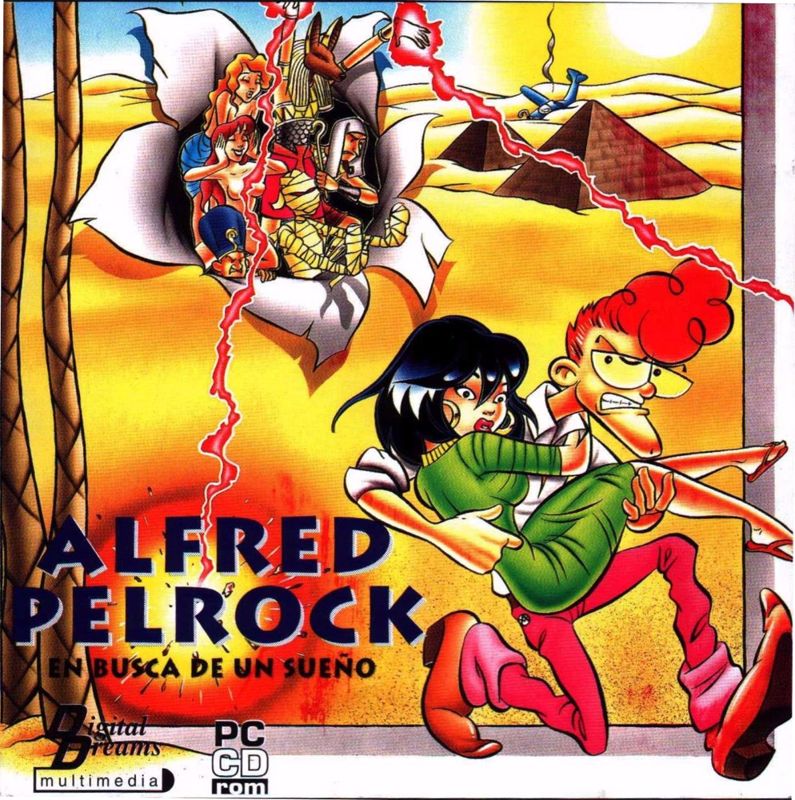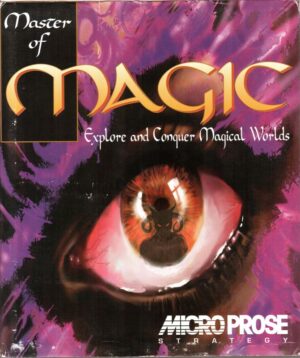Retro Replay Review
Gameplay
Alfred Pelrock’s gameplay embraces the classic point-and-click adventure format, offering players a set of intuitive icons for walking, examining items, talking to characters, and interacting with the environment. From the moment you step into Alfred’s worn shoes, the user interface feels familiar yet polished, allowing you to focus on puzzle-solving rather than wrestling with controls. The straightforward icon bar at the bottom of the screen encourages experimentation: try picking up that curious scarab, speak to the mysterious merchant, or simply wander deeper into the darkening sands of the desert.
(HEY YOU!! We hope you enjoy! We try not to run ads. So basically, this is a very expensive hobby running this site. Please consider joining us for updates, forums, and more. Network w/ us to make some cash or friends while retro gaming, and you can win some free retro games for posting. Okay, carry on 👍)
Puzzle design in Alfred Pelrock strikes a balance between lighthearted challenge and narrative-driven goals. Early tasks—such as using a shovel to unearth a key or trading supplies with a caravan guard—warm you up to more complex mechanics later in the game. These layered puzzles cleverly integrate Egyptian mythology, requiring you to translate hieroglyphs, manipulate ancient devices, and combine oddball objects like a rubber chicken with a pulley system. Though a handful of puzzles lean toward the obtuse side, most feel fair and reward lateral thinking.
One standout feature is Alfred’s dream-based hint system. If you find yourself stuck, you can replay snippets of the dream sequence to glean cryptic clues about your next objective—such as the significance of a scarab necklace or the sequence of pillars within the pyramid. This mechanic reduces frustration without handing you every answer outright. Together with a generous save-and-load feature, Alfred Pelrock maintains a smooth gameplay rhythm, keeping players engaged through moments of humor, discovery, and occasional head-scratching.
Graphics
Visually, Alfred Pelrock fully embraces the pixel-art aesthetic of late ’80s adventure classics. Each scene is meticulously painted with warm desert hues, contrasting the dusky twilight outside the pyramid with the torchlit corridors within. Backgrounds are rich with detail: rolling dunes dotted with palm trees, bustling bazaars filled with animated NPCs bartering wares, and the foreboding silhouette of the pharaoh’s stone monument rising against a star-speckled sky.
Character sprites are equally charming, boasting exaggerated facial expressions and playful animations that complement the game’s adolescent humor. Alfred himself has a wide-eyed, slightly disheveled look that perfectly captures his unwitting hero status, while supporting characters—from a sarcastic tomb guard to a flirtatious desert nomad—deliver gestures that bring dialogue exchanges to life. Cutscenes, though limited in animation, use clever camera pans and close-ups to heighten narrative moments without altering the retro vibe.
The color palette remains surprisingly vivid for a game rooted in an antiquated style. Shimmering golds highlight treasure chambers, deep blues and purples set a haunting mood during tomb explorations, and occasional neon-pink graffiti left by a prankster ghost injects unexpected bursts of personality. While modern gamers may crave 3D environments or high-definition textures, the nostalgic pixel approach here offers a timeless charm that stands out among contemporary indie adventures.
Story
At its heart, Alfred Pelrock is driven by an absurd yet endearing plot: Alfred, a seemingly directionless fellow, is jolted awake by a dream of an Egyptian princess trapped in her father’s pyramid. With no credentials beyond boundless enthusiasm and a questionable grasp of archaeology, he embarks on a quest across scorching dunes and treacherous tombs to rescue his mysterious beloved. The premise may sound far-fetched, but it provides a perfect canvas for the game’s tongue-in-cheek humor.
The writing leans heavily into adolescent ’80s film tropes: slapstick jokes, cheesy one-liners, and pop-culture nods that will elicit knowing laughs from players familiar with that era. Alfred’s internal monologue often veers into absurdity—he frets about forgetting his sunscreen one moment, then philosophizes on the meaning of royal lineage the next. Supporting characters, from a self-proclaimed “scarab whisperer” to a mummy with commitment issues, add layers of comedic relief without derailing the adventure’s forward momentum.
Beyond the humor, there’s a surprisingly heartfelt core to Alfred’s journey. As he delves deeper into the pharaoh’s labyrinth, snippets of the princess’s backstory emerge: her longing for freedom, her defiance of a tyrannical father, and her trust in an unlikely savior. These moments of genuine emotion—delivered through poignant text and subtle visual cues—lend weight to Alfred’s absurd quest, ensuring that players remain invested in both the laughs and the stakes.
Overall Experience
Alfred Pelrock nails the sweet spot between nostalgia and fresh adventure. Its blend of classic point-and-click mechanics, colorful pixel art, and cheeky humor makes for a thoroughly entertaining ride through ancient Egypt. Whether you’re a veteran of Sierra and LucasArts adventures or a newcomer seeking a lighthearted romp, Alfred’s escapades offer enough variety and personality to keep you hooked from the first dune to the final sarcophagus.
The game’s pacing is generally strong, though a few late-stage puzzles may require note-taking or patient trial-and-error. Thankfully, the integrated dream-hint system alleviates the most frustrating impasses, and frequent save slots mean you can experiment freely without fear of losing progress. With an average playtime of eight to ten hours, Alfred Pelrock strikes a satisfying balance between leisurely exploration and narrative drive.
Ultimately, Alfred Pelrock stands out as a labor of love from its publisher, paying homage to adventure classics while forging its own quirky identity. Its adolescent humor may not resonate with everyone, but for those who appreciate a good pun, inventive puzzles, and pixelated grandeur, this game delivers an experience both charming and memorable. If you’ve ever dreamed of unearthing hidden treasures—or simply wish to indulge in a comically offbeat quest—Alfred Pelrock awaits your discovery.
 Retro Replay Retro Replay gaming reviews, news, emulation, geek stuff and more!
Retro Replay Retro Replay gaming reviews, news, emulation, geek stuff and more!









Reviews
There are no reviews yet.